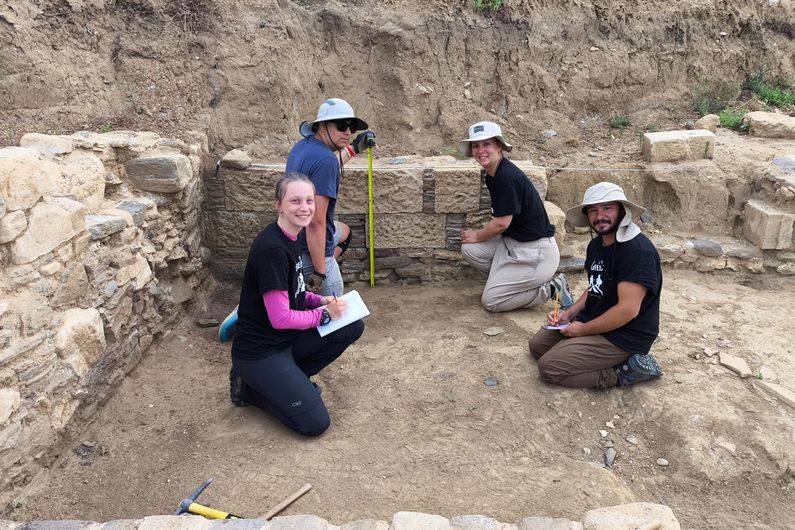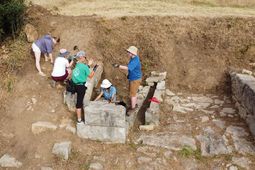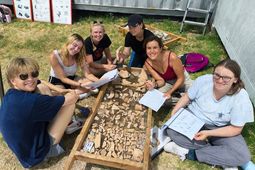Argilus: Thirty years of archaeological digs and discoveries—and counting!
- UdeMNouvelles
08/14/2024
- Martin LaSalle
More than 50 students are part of an archaeological mission led by Professor Jacques Perreault in the ancient Greek city of Argilus, where digs have been taking place since 1992.
Dispensary or mini-hospital
Last year, the students searched the interior of a room in a new building, where they unearthed some unusual objects, including an ancient hot-water bottle made of clay.
“The Greeks called this object a thermofora,” said Perreault. “It would take the shape of the part of the body on which it was placed. At the time, it was generally found in hospitals. This discovery, combined with the other artifacts we’ve found, leads us to believe that this building must have housed some kind of dispensary or mini hospital.”
The budding archaeologists will also visit the site to study its architecture and structure and plan future digs.
Preparing the next generation
The summer internships cover a range of subjects—principles of archeological excavation, handling and identification of objects and artifacts, the history of the region and its significance—and use a variety of approaches to spark the students’ curiosity and get them excited about ancient history.
Perreault hopes they will become interested in careers in the field. For years, he has included Cégep students in his trips to Greece. This year, he is accompanied by students enrolled in the history and civilization program at Cégep de Rosemont and Cégep Lionel-Groulx. Under an agreement between these two Cégeps and UdeM’s Faculty of Arts and Science, the best students in the program can take Perreault’s Introduction to Archaeology course and receive credit for the course if they subsequently enroll in the Department of History.
Every year, between 1,000 and 1,500 objects are discovered at the site of the ancient city of Argilus, where archaeological digs have been led since 1992 by Jacques Perreault, a professor in the Department of History at Université de Montréal.
Argilus was a colony in northern Greece founded around 655-654 BCE.
This year, from June 3 to July 6, 40 university students and 12 Cégep students will be in Argilus to work on the artifacts unearthed last year.
“In our digs, we do a preliminary sorting, where we assess each piece and classify it according to its function,” Perreault explained. “Each object is photographed, sketched and numbered for reporting purposes, but they need to be analyzed in greater detail to better understand the environment as a whole, and that’s what we’re doing this year, to begin with.”
Greek-Canadian archaeological mission at Argilus
The Greek-Canadian archaeological mission at Argilus is a long-term collaboration between the Ephorate of Antiquities of Kavala-Thasos and UdeM. Under the direction of Zisis Bonias and Jacques Perreault, the mission welcomes about 40 Canadian and European students each year to conduct digs at the site of the ancient city of Argilus, assisted by skilled workers and researchers in various fields.
Argilus was the first Greek colony near the Struma and the Pangaion Hills on the Thracian coast. Literary accounts of the site describe some of the key events in its history and seem to indicate that it was a thriving city, at least until the founding of Amphipolis in 437 BCE. It is believed it was abandoned around the year 357, after being conquered by Philip II. It was rediscovered by French archaeologist Paul Perdrizet in 1883.
Centre for Classical Studies summer school growing in popularity
Close to 120 students from various UdeM departments also attended the summer school organized by the Centre for Classical Studies, in collaboration with the Canadian Institute in Greece, of which Jacques Perreault is the director.
Between April 30 and May 20, two groups of students took the Attica-Peloponnese tour, while a third group completed the Cyclades and Crete tour from May 12 to 31.
In the first week, the students attended classes at the Canadian Institute in Greece and then went on excursions in the afternoons. They visited museums and historical sites in Athens and the regions they toured.
“The popularity of the Centre for Classical Studies summer school in Greece is growing year by year,” said Perreault. “Two years ago, we had 40 students, the following year 80 and this year 120! Some are students of history or classics, but many come from other disciplines, including communications, psychology, bioethics, computer science, art history, political science... For some, it’s a way to finish their undergraduate studies on a high note and discover new things.”














